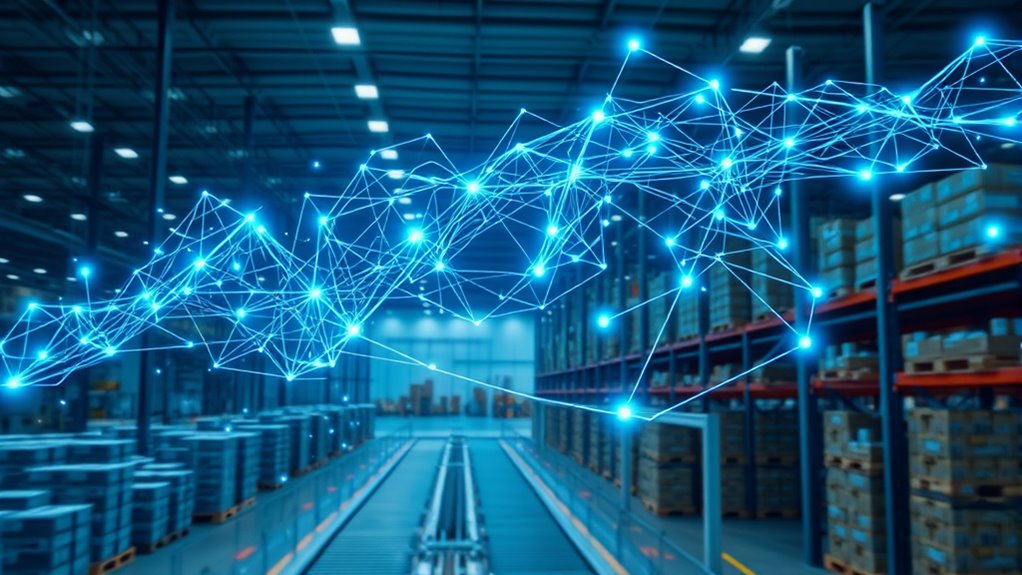Blockchain exposes supply chain secrets by offering a secure, transparent ledger that tracks every product step from raw materials to final delivery. It makes all data visible and unchangeable, revealing previously hidden practices and irregularities. This increased transparency discourages fraud, improves recall efficiency, and boosts consumer trust. With every transaction encrypted and time-stamped, you can see how supply chains operate behind the scenes. Keep exploring to learn how this technology is transforming transparency even further.
Key Takeaways
- Blockchain’s transparency reveals hidden supply chain practices by providing immutable, accessible records of all transactions and product movements.
- It uncovers discrepancies and irregularities, exposing unethical or illegal activities like counterfeiting and fraud.
- Real-time traceability exposes secrets related to sourcing, processing, and distribution channels to stakeholders.
- Secure, encrypted data prevents tampering, making unauthorized changes detectable and revealing misconduct.
- Enhanced visibility fosters accountability, encouraging companies to disclose more detailed and truthful supply chain information.

Have you ever wondered how blockchain technology is revolutionizing supply chains? It all starts with the digital ledger—a secure, transparent record of every transaction and movement within the supply chain. Unlike traditional systems, where data can be altered or hidden, a blockchain’s digital ledger is decentralized and immutable. This means every participant, from suppliers to retailers, has access to the same unchangeable record, fostering trust and accountability. As a result, companies can now track products at every stage, from raw materials to final delivery, with unprecedented accuracy. This traceability enhancement allows you to see exactly where your products originate, how they’re processed, and where they’re headed next, all in real time. No more relying solely on paper documents or siloed databases that can be manipulated or lost. Instead, you get a single source of truth that everyone can verify instantly, reducing errors and disputes. Additionally, the secure nature of blockchain helps prevent counterfeiting and unauthorized alterations, strengthening supply chain integrity.
By leveraging blockchain’s digital ledger, supply chain transparency becomes a reality. When you scan an item, you can immediately access its entire history—who handled it, where it was stored, and whether it adhered to quality standards. This level of traceability helps you identify bottlenecks, prevent counterfeiting, and ensure compliance with regulations. It also makes recalls faster and more precise because you can pinpoint affected batches without sifting through mountains of paperwork. For consumers, this means greater confidence in product authenticity and safety. For businesses, it means reduced fraud, minimized theft, and stronger supplier relationships. The traceability enhancement provided by blockchain doesn’t just improve efficiency; it exposes hidden practices or irregularities that might have otherwise gone unnoticed.
What makes blockchain especially powerful is its ability to provide a tamper-proof record that’s accessible to all authorized parties. When a transaction is added to the digital ledger, it’s encrypted and time-stamped, making it nearly impossible to alter without detection. This transparency discourages unethical practices and encourages compliance. As more companies adopt blockchain, supply chains become more accountable, revealing secrets that were previously obscured by opaque processes. You, as a stakeholder, gain insight into the true origin and journey of your products, empowering you to make more informed decisions. Ultimately, blockchain’s traceability enhancement transforms supply chains from complex, opaque networks into transparent, trustworthy systems—changing the way businesses operate and how consumers perceive their products.
Frequently Asked Questions
How Does Blockchain Ensure Data Privacy in Supply Chains?
You might wonder how blockchain keeps supply chain data private. It does this through data encryption, making sure sensitive info stays secure and unreadable to outsiders. Additionally, access controls restrict who can view or modify data, giving you control over your information. These features work together to protect your supply chain details, ensuring transparency for authorized parties while safeguarding confidential information from unauthorized access.
Can Small Businesses Afford Blockchain Integration Costs?
You might think blockchain integration costs are too high for small businesses, but a thorough cost analysis can show it’s more affordable than you expect. By carefully selecting vendors with flexible pricing and scalable solutions, you can minimize expenses. Blockchain’s transparency and security benefits can boost your supply chain efficiency, making the investment worthwhile. Small businesses can leverage blockchain technology today by choosing the right partners and understanding your costs upfront.
What Are Common Challenges in Adopting Blockchain for Supply Chains?
When adopting blockchain for supply chains, you’ll face challenges like ensuring digital authentication and maintaining regulatory compliance. You might find integration complex, especially with existing systems, and costs can be significant. Training staff and managing data security are also hurdles. Despite these issues, the transparency and security blockchain offers can greatly improve your supply chain operations if you’re willing to navigate these obstacles.
How Does Blockchain Handle Data Discrepancies or Errors?
When you encounter data discrepancies or errors, blockchain handles them by leveraging digital signatures and audit trails. Digital signatures verify data authenticity, ensuring only authorized changes occur, while audit trails provide a transparent record of all modifications. This combination helps you identify where errors happened, trace their origins, and maintain data integrity, making your supply chain more reliable and secure.
What Future Developments Are Expected in Blockchain Supply Chain Technology?
They say the future is always a step ahead, and in blockchain supply chain tech, it’s no different. You can expect smarter contracts that automate processes and enhance transparency. The digital ledger will become more sophisticated, enabling real-time tracking and better integration with IoT devices. These advancements will make supply chains more secure, efficient, and resilient, turning the old adage into a reality where innovation keeps pushing boundaries.
Conclusion
Just like a lighthouse guides ships through foggy waters, blockchain illuminates your supply chain’s secrets, revealing hidden currents and unseen obstacles. With its transparent glow, you navigate confidently, avoiding hidden reefs and charting a clear course forward. As the waves of innovation crash ashore, embrace blockchain’s light to keep your supply chain steady and true, steering through the storm with clarity and trust. Your journey becomes smoother, safer, and unstoppable.









